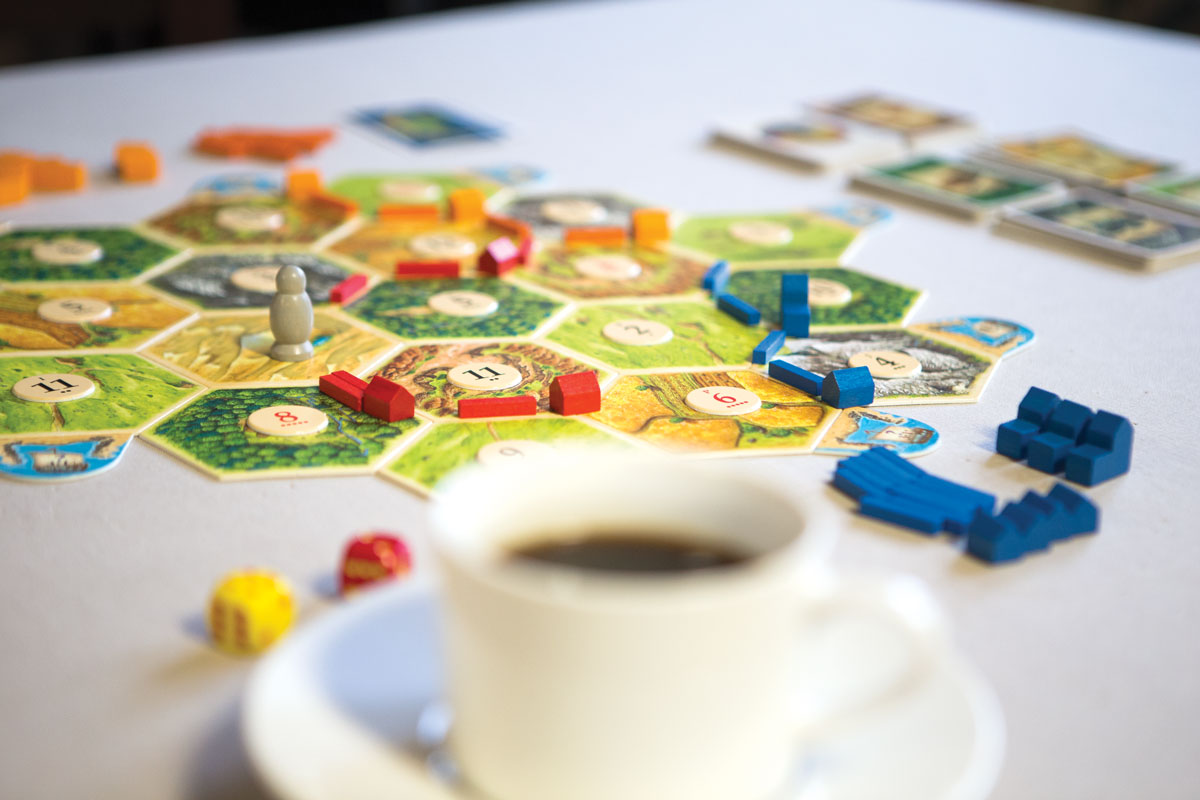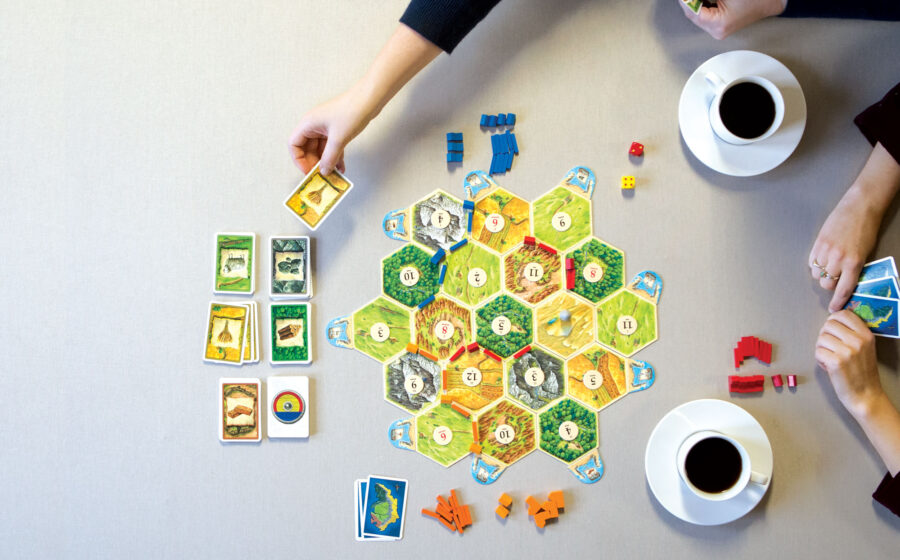[A] café filled with camping customers glued to their smartphones or computer screens, nursing the dried out foam of a long-ago finished cappuccino and dabbing at the crumbs of a scone, is the picture of a problem that coffeehouses and tea shops have faced since the advent of Wi-Fi. In many ways the problem isn’t that new customers can’t find spaces to sit, it’s that the atmosphere is so tech-zombie it feels antisocial.
One solution that a small number of cafés have found is to trade, or at least supplement, one form of entertainment—the solitary Internet—with another—communal tabletop games. Some are classics like Scrabble and Risk, others are childhood favorites like Guess Who? and Jenga, but most are newer, more sophisticated, and sometimes decidedly adult games like Settlers of Catan, Pandemic, and Cards Against Humanity that keep players entertained for hours. Just as cartoons and videogames have grown to cater to adult audiences, tabletop games now attract older players. What makes them such a good fit for cafés is that unlike many other forms of grownup entertainment, tabletop games require a sharp and sometimes caffeine-aided mind.
GameHäus Café in Glendale, California, has a growing game library of nearly 900 titles and serves Groundwork Coffee (a local LA roaster) along with sandwiches and snacks. “The hook, the draw, and the gimmick is the games, but the majority of revenue is the food and drinks,” says Robert Cron, co-owner of GameHäus. “If your coffee and food are terrible, you could have all these games and it doesn’t matter. It was important to us to work up a good menu.”
“The hook, the draw, and the gimmick is the games, but the majority of revenue is the food and drinks.”
Patrons pay a flat fee of five dollars for unlimited game play, and Cron says most people also order food or at least beverages on top of that (coffee and tea are the most popular drinks). “If you’re here more than an hour you’re probably doing more than nursing a glass of water,” he says. During slower periods, such as weekday lunchtime, employees from nearby offices stop by for a coffee or lunch break without paying to play the games, which Cron calls “free parking.” But the space, which can comfortably seat around eighty people, is completely booked during the weekends, so “free parking” doesn’t apply.
When regulars make inquiries about employment, Cron says he’ll ask what they think the job entails, a question intended to weed out the people who just want to play games from those ready to pull shots or unclog a toilet. “The hobbyists who want to work here don’t realize there’s all this other stuff that goes with this,” he says. “They think, ‘I’m gonna’ play games all day and get paid for it.’ I’m the co-owner and I don’t get to do that. It’s a game space but you have to think of yourself as a coffee shop owner.”
Some of Cron’s staff had prior barista experience, but that’s not a requirement. “You could have a fantastic barista with a horrible attitude or someone who’s eager to learn,” he explains. Nor does he require an encyclopedic knowledge of games. “If you go work at a grocery store or in retail, the knowledge of what you’re selling is eventually going to come along,” he says.
Patrons have varying expectations about the level of game instruction they can receive. Simply setting up the board for an even mildly complicated game can take twenty minutes for first-time players, and some players want a guide through a round of action or two. Because some games last several hours, many players want a solid idea of what they’re about to devote an afternoon to playing. “Some people want a more curated experience, they want a sommelier,” Cron says. “Some people just want to be left alone. It’s finding the right temperature of every person who walks in to see what their level of neediness is.”

The Board and Brew in College Park, Maryland, charges the same five-dollar fee for unlimited games, but takes a slightly different approach. Baristas and cooks focus on the food and drinks, but on Monday, Friday, and Saturday evenings, a game guru floats around the space and helps patrons learn new games. “There are people that all they know are the classic games that they played growing up, and there’s a bunch of games that are way better,” explains Ben Epstein, cofounder and owner of the Board and Brew, which stocks more than 500 games. “Having a game guru can get them excited about trying new games. We’ve had a really good response, and they’re much more likely to return because they’ve learned something different.”
The majority of gameplay at the Board and Brew happens in the evenings or on weekends, so mornings and lunchtime tends to draw students ordering coffee or lunch. Epstein points out that many popular strategy games like Settlers of Catan take up significant table real estate, so having a large enough space is key. (The Board and Brew occupies 3,000 square feet.) And while people tend to order multiple items—“If you’re there for three or four hours you’re bound to get a little bit hungry,” Epstein points out—the game fee is important to his business model, because longer games means lower turnover of tables. It also helps offset the cost of games. Modern board and card games start at around thirty dollars and can run to seventy-five or more.
While coffee shops like the Board and Brew and GameHäus boast an extensive library of board games available with a flat fee per person, some cafés offer a much smaller selection of games that patrons can play for free. Small Point Café in Providence, Rhode Island, has a shelf of games that help patrons feel more at home. “Scrabble and Connect Four are huge ice-breakers with first-time coffee shop dates and old friends,” says owner Adam Buck.
Many popular strategy games like Settlers of Catan take up significant table real estate, so having a large enough space is key.
Earlier this year, Small Point Café also started up a board game night on Thursday evenings. “One of my staff is very involved with board games herself, so she’s taking on the hosting,” Buck says. “As the owner I’m willing to pay people to host it and be there to run it. She does the promotion, she’ll do our Facebook and postings on social media and she greets people. It does do a little bit of business—most of the people that come will buy a cup of coffee—but it’s more about building community.”
Each game night brings in a group of around four to twelve people, some first-timers, some regulars who bring their favorite games from home. Since the café is open until nine every night but Monday, Buck says, “We’re trying to have a place for people to go that’s not a bar. (The game night is) helping us reach out to those people who want to go out and do something social that’s not drinking.”
Sometimes the impetus for a game night comes not from staff members, but the patrons themselves. At Recess Coffee in Syracuse, New York, a group of game-loving guys asked for space on Thursday nights. “Usually most people will buy something at the beginning and something halfway through,” says co-owner Jesse Daino.
That group no longer congregates at Recess, but the coffee shop does have a little nook with a shelf of games available on a free, self-catering basis. “They’re mostly more traditional games,” Daino says. “People have dropped off old games of theirs. We like to have Recess be a place where people feel really comfortable. This gives it another element as opposed to just studying or just work and helps people stay for a long time.”
—Susan Johnston is a freelance writer who covers small business for a number of publications. Photos by Cory Eldridge.









